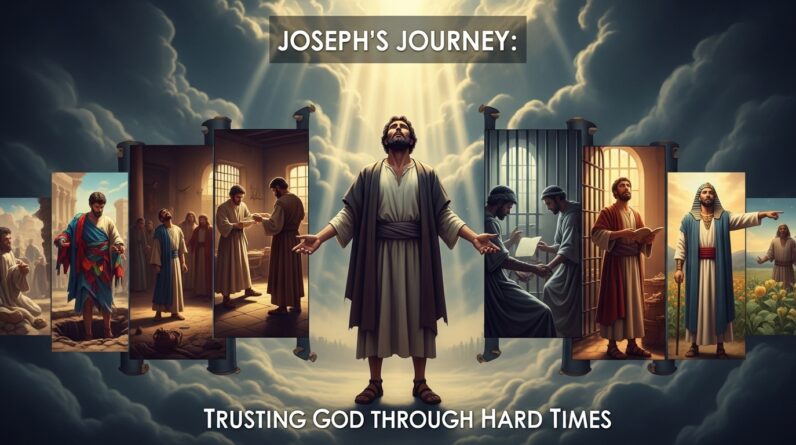Explore Ezekiel’s unwavering faith and courage. Dive into his bold mission during exile, revealing timeless truths about resilience and divine purpose in adversity.

Ezekiel: Faithfulness In Hard Assignments – Ezekiel 2:1-10
Ezekiel, a prophet who lived during the Babylonian exile, stands as a compelling figure in the narrative of Israel’s history. Called to prophesy in a turbulent time, his life and mission underscore themes of faithfulness and obedience amidst adversity. Ezekiel 2:1-10 offers a glimpse into his daunting assignment from God, highlighting the complexities and pressures of serving as a divine messenger when the world seems to crumble around you.
Introduction
Imagine being tasked with a job knowing it would be met with scorn or even outright hostility. Ezekiel, often recognized for his vivid prophetic visions, was called to such an assignment. During an era when his people were displaced and disillusioned, Ezekiel’s message from God was neither gentle nor conciliatory. It was firm, unyielding, and unequivocal. Yet, his story speaks volumes about the steadfast commitment required to deliver God’s message, no matter how hard the truth might be for others to hear. In this mirror of dedication, Ezekiel teaches us how to remain firm and faithful even amid life’s most challenging trials.
Their Story in the Bible
Ezekiel’s narrative begins at an extraordinary juncture marked by exile and despair. The Israelites were estranged from their homeland, grappling with the profound consequences of their rebellion against God. Against this backdrop, Ezekiel received his call unlike any other biblical figure. In Ezekiel 2:1-10, God commissions him to speak to a “rebellious nation” and warns him that his mission will not be easy. The people he was to address were described as hard-hearted and obstinate, resistant to hearing a divinely inspired prophecy that was anything but comforting.
Ezekiel’s commissioning was characterized by an inaugural vision of God’s glory and a scroll containing lamentations, mourning, and woe that he was commanded to eat. This symbolic act signified the profound internalization of God’s message that Ezekiel was to deliver, despite knowing it would be rejected by many. The image of the scroll reflects the gravity of his calling. Rather than a mere rhetorical exercise, his prophecy involved a transformative encounter with divine truth, compelling him to digest the hard realities destined to be conveyed to the people.
Throughout his ministry, Ezekiel was a conduit for messages that were often riddled with visions, parables, and symbolic acts. These complex forms challenged the prevailing sensibilities of the time and offered a deeper, albeit unsettling, truth about the spiritual state of Israel. His interaction with God was marked by obedience, even when God required him to undertake extreme symbolic actions. Through Ezekiel’s story, we are reminded of the intense spiritual engagement needed to remain faithful to divine mandates in an age of skepticism and defiance.
Lessons from Ezekiel’s Life
Ezekiel’s story is rife with lessons relevant to contemporary living. First, the importance of obedience even in difficult circumstances is a central tenet of Ezekiel’s life. He was tasked with conveying messages that were not popular or easy, yet his unwavering commitment to divine instructions is evident throughout his narratives. This exemplifies the notion that true faithfulness often requires a commitment to confronting difficult truths and responsibilities head-on, regardless of societal pressures or personal discomfort.
Second, Ezekiel’s life teaches the necessity of internalizing divine wisdom. The act of eating the scroll symbolizes the thorough assimilation of God’s word into one’s life. This internalization equips believers to face the trials and oppositions encountered in the world, empowering them to be unshakeable in their convictions and purpose.
Finally, Ezekiel’s journey underscores the idea that true leadership involves service anchored in spiritual authority rather than earthly approval. Ezekiel demonstrated that authentic faithfulness is not contingent on approval or recognition from others but rather on fulfilling one’s divine purpose with integrity and resilience.
Connection to Today’s World
Ezekiel’s narrative has palpable relevance in today’s complex world, where truth is often obscured by convenience and compromise. The task of speaking hard truths, much like Ezekiel’s, often entails risking one’s comfort and standing within society. In families, workplaces, and communities, individuals frequently encounter opportunities to stand firm in integrity, echoing Ezekiel’s commitment to divine mandates.
The resistance Ezekiel faced mirrors the challenges of modern-day advocates for truth and justice, who often struggle against systemic oppression and societal indifference. Ezekiel’s faithfulness in delivering God’s message encourages us not to shy away from standing for truth, even when it comes at a cost. In doing so, we find courage and perseverance in his example, knowing that our fidelity to truth contributes to the broader purpose of justice, healing, and righteousness.

Key Bible Verse
“Do not be afraid of them or terrified by them, though they are a rebellious people.” (Ezekiel 2:6)
This verse encapsulates Ezekiel’s mission and the reassurance God provides in the face of daunting tasks. It serves as a powerful reminder of divine companionship amid life’s uncertainties, urging believers to transcend fear and find solace in God’s steadfast presence.
Thought-Provoking Question
When faced with difficult tasks, how can you draw strength to prioritize God’s truth and purpose over present convenience and comfort?
Historical/Cultural Context
Ezekiel ministered during one of Israel’s darkest periods—the Babylonian exile, a time characterized by national disarray, loss of identity, and crisis of faith. Understanding this context is crucial to appreciating Ezekiel’s role as a prophet. The destruction of Jerusalem and the subsequent deportations left a profound impact on the Israelites, shaping their understanding of their covenant relationship with God. In this historical setting, Ezekiel’s message served not only as a testament to God’s judgment but also as a source of hope and restoration, urging his people toward repentance and renewal.
Comparison with Other Characters
Ezekiel’s prophetic journey can be paralleled to that of Jeremiah, another renowned prophet who faced hostility and rejection. While Ezekiel was in exile, Jeremiah remained in Jerusalem, and both prophets shared a mission to communicate God’s judgment and hope to their contemporaries. Their narratives complement one another, illustrating the diverse ways God speaks through his servants amid trials.
Prayer
Lord, as we reflect on the faithfulness demonstrated by Ezekiel, we seek your strength and wisdom to embrace our calling with courage and conviction. Help us internalize your truth, so that we may stand firm in the face of adversity and be messengers of your hope and justice. Amen.







